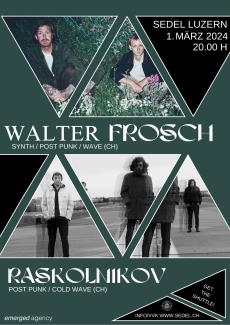Walter Frosch | Support: Raskolnikov
Walter Frosch have a similar effect on music listeners as doping has on athletes : stimulating and euphoric. Their music emphasizes moods and intensifies dance movements without being profane or superficial for even a millisecond. The songs have depth, and are cleverly arranged. What is the secret of the duo that inspires us so much with wave and verve ?The two musicians, who come from the Schaffhausen DIY scene, already toured Europe with their hardcore band YC-CY before they founded the duo Walter Frosch, named after the legendary footballer. Inspired by the sound of the 60s and 70s, with fresh ideas and the simplest means, their first album "Diskothekenbesitzer" (2020) was born. The first few hundred copies were sold out in no time. Two years later "Under A Spell" was released, numerous concerts followed, in Germany they opened numerous shows for Edwin Rosen, who is probably the most prominent fan of Walter Frosch since then - the press photos of Walter Frosch were also taken by him. In February 2023 Walter Frosch toured along the North American west coast. Before, during and after that the five songs were written, which are now collected and released as EP "A Sea Of Broken Light" on Irascible Records.
Influenced by the various wave, post-punk and shoegaze movements of the 70s, 80s and 90s, Raskolnikov's music is as melancholic as it is hypnotic and energetic, with existentialist lyrics. It's a mix of the dark and floating universe of coldwave, mixed with the rebellious energy of post-punk and the melodic density of shoegaze. A penetrating voice accompanies the music, communicating openended questions from a first-person perspective, about destruction, anger, obsession, oblivion, regression, fear, failure, pain, regret, downfall and loss of self, but not without references to hope. This polyphony of unordered consciousness, which leads to the division of the self, refers to the name of the group, which comes back to the protagonist Rodion Raskolnikov in Fedor Dostoevsky's socialpsychological-philosophical novel "Crime and Punishment" (in Russian: "Prestuplenie i nakazanie", 1866). The Russian word 'raskol' means schism, the break with the conventions of the musical genre to which the group's work refers, as well as the nominative notions of individual and collective being, reason and madness, isolation by society

